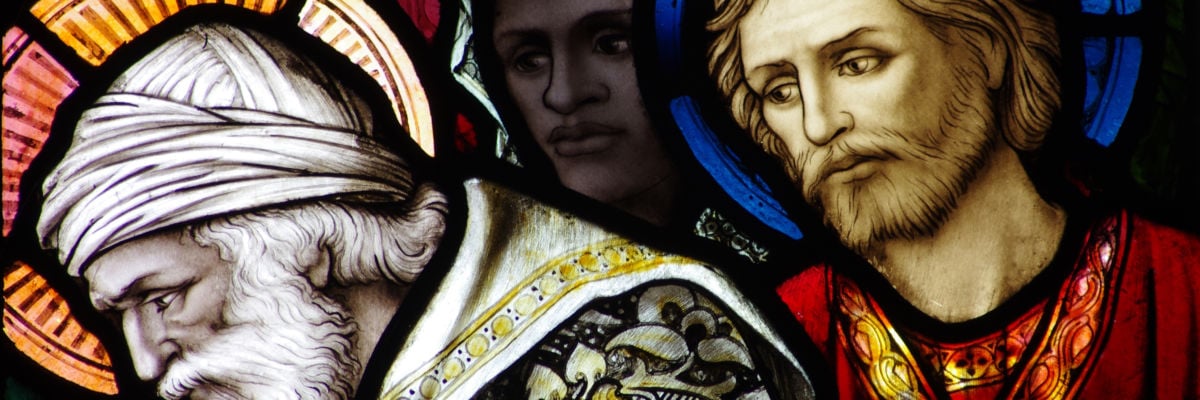
“We have seen his star in the East, and have come to worship him.”
I love the subtitle that we often see for the Epiphany: “The Manifestation of Our Lord Jesus Christ to the Gentiles.” And that is exactly what it is, because the magi from the east are not Jews; they are outsiders to the promises of Israel. They are, as the Old Testament prophets often put it, “the nations,” “the peoples.” And because this scene is so brief—it occurs only in one Gospel—it is almost too easy to pass it over.
Yet the tradition places huge significance on it. We’ll hear in that classic carol, “We Three Kings,” how the three gifts of gold, frankincense, and myrrh, suggest that Christ is king, God, and sacrificial victim. And of course the fact that Gentiles give these revealing gifts is a kind of foreshadowing of the ministry of St. Peter and St. Paul a few decades later, when the promises of God to Israel are expanded, and the promises that God made to Abraham way back in Genesis finally come true—that in him and his family, “all the nations” of the world will be blessed.
What should we make of that idea—that in this one person, this child, all the nations will be blessed? So often the particularity of the Incarnation appears to be an even more scandalous version of the particularity of Israel. Why does God work in this place, in this particular story? Our modern sensibilities for justice and equality find this difficult, and in my experience, this is one of the most constant questions about Christianity from the outside: how could you really believe that a transcendent God would be so weirdly exclusive? Why should these wise men from the east—kings, even—have to travel to this little town in the Roman province of Judea to encounter God?
To answer this, I’m drawn to a little opera that some of you probably know, called Amahl and the Night Visitors. It’s a short piece famously aired on NBC Christmas Eve of 1951—and you can easily find that original broadcast online. In the story, a poor boy and his mother meet the three kings as they search for Christ. I challenge you to listen to it or watch it without tearing up.
The mother asks the kings to describe the child they seek. So Melchior sings:
Have you seen a child the color of wheat . . .
the color of dawn?
His eyes are mild; his hands are those of a king
—as king he was born.
Incense, myrrh, and gold we bring to his side;
and the eastern star is our guide.
The mother responds:
Yes, I know a child the color of wheat . . .
the color of dawn.
His eyes are mild;
his hands are those of a king as king he was born.
But no one will bring him incense or gold . . .
though sick and poor and hungry and cold.
He is my child my son, my darling my own.
The three kings then add,
Have you seen a child the color of earth…
the color of thorn?
His eyes are sad; his hands are those of the poor
as poor he was born.
Incense, myrrh, and gold we bring to his side,
and the eastern star is our guide.
The mother again:
Yes, I know a child the color of earth . . . the color of thorn.
His eyes are sad;
his hands are those of the poor,
as poor he was born.
But no one will bring him incense or gold . . .
though sick and poor and hungry and cold.
He is my child, my son, my darling . . . my own.
I’d go on, but I won’t do justice to the music and the poetry, not to mention I don’t want to start sobbing here.
What do you notice? I see a couple of things. One is that this child, despite his particularity, is a sort of universal. The kings describe him in this rich, natural imagery that suggests an elusive beauty and goodness. But the mother—and this is the other thing—can hear in the descriptions only the person of her own child. And for her this is a great sadness, drawing out the scandal of God’s sovereign choice. Why should that child get all the gifts? Shouldn’t her child get gifts as well?
This is the most natural sentiment in the world. In the last couple of months, my family has been in mourning for the child of a dear friend who died, as they say, far before his time. We want to cry over and over: why him? It just isn’t fair. How often do we look at a more fortunate person with jealousy, questioning the injustice of history? And then don’t we often think of God’s gifts and God’s calling in this way? Surely part of the confusion we see in the Church right now over sexuality and marriage is this closely related feeling: how can it be fair that this couple’s relationship can be blessed but not that one’s? We tend to think—and modern culture forms us to think—that the only “justice” can be when everyone gets exactly the same thing.
But let’s skip to the ending—of Amahl’s story, at least. It works out with a happy ending precisely because, contrary to the mother’s natural intuitions, the particularity of Christ is not competitive, just as the particularity of Israel wasn’t competitive. The fact that this child is the chosen one, the Messiah, the incarnate Son of God, does not mean that other children are cursed. In fact, it means that all other children can be so much greater because of his greatness. In him all the nations of the world are blessed. But there’s an irreducible singularity to this child all the same, for that blessing doesn’t mean that everybody is the same, or that everybody gets the same thing, or that we just declare ourselves blessed on our own terms as we are. We have to make the journey, like the magi, which is to say we have to commit to a course of change. We have to submit to the particularity of encounter with this child. We don’t get to follow our own favorite star to New York or Paris or Tokyo; we have to follow this one star to Bethlehem.
It might be useful to think on this occasion of the things we can offer to the newborn Christ. That is a great theme of so many Christmas carols, from “In the Bleak Midwinter” to the little drummer boy. But, before we can offer anything, we have to seek him. We cannot get to the universal blessings—the peace and joy and good will toward men—without finding him, and only him—not generic sentiment that passes for Christmas cheer in popular culture, nor a version of him that fulfills all our modern political hopes, but Jesus Christ the Lord, the hope of the nations, born of Mary.
So in this season of epiphany, of revelation and manifestation, seek the face of him who came among us. Seek him and worship him, as he came to us at Bethlehem, as he comes to us in the most holy sacrament of the altar, and as he comes to us in the stillness of our restless hearts. Seek him.



